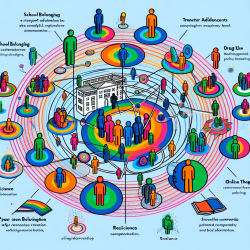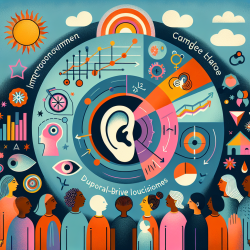As a speech-language pathologist dedicated to creating positive outcomes for children, it is crucial to understand the unique challenges faced by transgender adolescents. The research article titled Understanding Intersectionality and Resiliency among Transgender Adolescents: Exploring Pathways among Peer Victimization, School Belonging, and Drug Use provides valuable insights that can guide our practices and improve the support we offer to these vulnerable youth.
The study employs structural equation modeling to explore the relationships among school belonging, peer victimization, and drug use for transgender youth. Key findings indicate that school belonging mediates the pathway between peer victimization and drug use. This highlights the importance of fostering a supportive and inclusive school environment for transgender students.
Key Takeaways for Practitioners
- School Belonging as a Protective Factor: Transgender adolescents who feel a sense of belonging in their school are less likely to engage in drug use, even if they experience peer victimization. Creating an affirming school climate where students feel included and accepted can significantly reduce negative outcomes.
- Intersectionality Matters: The study found that transgender youth of color (YOC) experience greater victimization but do not engage in higher drug use compared to their white transgender peers. This suggests that multiple minority statuses may contribute to resilience, and interventions should consider the intersecting identities of students.
- Socioeconomic Status (SES): Transgender youth from low SES backgrounds reported higher levels of victimization and drug use. This underscores the need for targeted support and resources for students from economically disadvantaged backgrounds.
Actionable Strategies
- Implement Affirmative Policies: Ensure that school policies allow transgender students to use their correct names and pronouns, access appropriate bathrooms, and participate in activities that align with their gender identity.
- Supportive School Personnel: Train school staff to be knowledgeable about transgender issues and to intervene when they witness gender-discriminatory remarks or behaviors.
- Inclusive Curricula and Clubs: Incorporate LGBTQ topics into the school curriculum and support the creation of clubs like Gender and Sexuality Alliances to foster a sense of community and belonging.
By integrating these research findings into our practice, we can better support transgender adolescents and help them navigate the challenges they face. Creating a school environment where all students feel safe, valued, and included is essential for their well-being and academic success.
To read the original research paper, please follow this link: Understanding Intersectionality and Resiliency among Transgender Adolescents: Exploring Pathways among Peer Victimization, School Belonging, and Drug Use.










